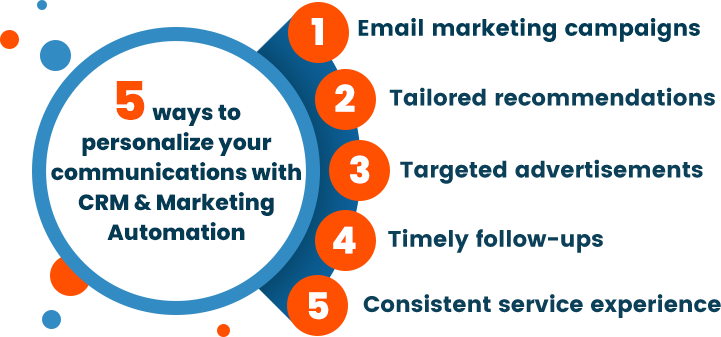Tailored Marketing Automation: Precision in Customer Engagement


Tailored Marketing Automation: Precision in Customer Engagement
In the dynamic landscape of digital marketing, personalized marketing automation has emerged as a powerful strategy to engage customers on an individual level. By harnessing advanced technologies, businesses can deliver tailored experiences that resonate with each customer, fostering meaningful connections and driving conversions.
The Foundation of Personalized Marketing Automation
At the heart of personalized marketing automation lies data. Businesses gather and analyze customer data, including preferences, behaviors, and demographics, to understand their audience deeply. This data-driven approach forms the foundation for creating highly targeted and personalized marketing campaigns.
Segmentation for Targeted Outreach
Segmentation is a key component of personalized marketing automation. By categorizing customers into specific segments based on shared characteristics, businesses can tailor their messages to each group’s unique preferences. This targeted outreach ensures that marketing efforts are more relevant and resonate with the distinct needs of different customer segments.
To explore the latest trends and insights in personalized marketing automation, visit Personalized marketing automation for comprehensive information.
Dynamic Content for Personalized Experiences
Dynamic content allows businesses to create personalized experiences by tailoring website content, emails, and advertisements based on individual user behavior. Through automation, dynamic content adapts in real-time to user interactions, displaying relevant information and recommendations. This level of personalization enhances user engagement and increases the likelihood of conversions.
Behavioral Triggers and Customer Journeys
Personalized marketing automation goes beyond static campaigns; it involves understanding and responding to customer behavior in real-time. By implementing behavioral triggers, businesses can automate responses based on specific actions or milestones in the customer journey. This ensures that customers receive timely and relevant communications, enhancing their overall experience.
Personalized Email Campaigns
Email marketing remains a powerful tool, and personalized marketing automation takes it to the next level. Businesses can craft personalized email campaigns that speak directly to each recipient. This includes personalized subject lines, content based on past interactions, and targeted offers. Personalized emails not only capture attention but also drive higher open and click-through rates.
Predictive Analytics for Anticipating Needs
Predictive analytics leverages machine learning algorithms to analyze data and predict future customer behavior. By understanding what customers are likely to do next, businesses can proactively tailor their marketing efforts. This anticipatory approach allows for the delivery of personalized recommendations, offers, and content, creating a more intuitive and satisfying customer experience.
Cross-Channel Consistency for Unified Messaging
In the era of multichannel marketing, maintaining consistency across channels is crucial. Personalized marketing automation ensures that the messaging aligns seamlessly across various touchpoints, whether it’s a social media ad, a website visit, or an email. This unified approach contributes to a cohesive brand experience and reinforces personalized interactions.
A/B Testing for Continuous Optimization
To fine-tune personalized marketing strategies, A/B testing is an invaluable tool. By experimenting with different elements of campaigns—such as subject lines, visuals, or calls to action—businesses can identify what resonates most with their audience. This iterative process allows for continuous optimization, ensuring that personalized marketing efforts are always evolving based on real-time insights.
Compliance and Customer Privacy
In the era of heightened awareness around data privacy, businesses must prioritize compliance when implementing personalized marketing automation. Obtaining explicit consent, transparently communicating data usage policies, and ensuring adherence to privacy regulations are paramount. Building trust with customers by respecting their privacy is crucial for the success of personalized marketing strategies.
Measuring Success with Analytics and KPIs
Personalized marketing automation is not a set-it-and-forget-it strategy; it requires ongoing analysis and optimization. Businesses must define key performance indicators (KPIs) aligned with their objectives and regularly analyze analytics data. This continuous evaluation allows for insights into what’s working, what needs adjustment, and how personalized marketing efforts contribute to overall business goals.
Future Trends: AI and Hyper-Personalization
As technology evolves, the future of personalized marketing automation holds exciting possibilities. Artificial intelligence (AI) will play a more significant role, enabling advanced personalization through deep learning and predictive modeling. Hyper-personalization, where every interaction is uniquely tailored, is on the horizon, promising even more engaging and relevant customer experiences.
Conclusion
Tailored marketing automation represents a paradigm shift in how businesses connect with their audience. By leveraging data, behavioral insights, and advanced technologies, personalized marketing automation enables businesses to deliver individualized experiences at scale. As technology continues to advance and customer expectations evolve, the ability to create hyper-personalized and meaningful interactions will be a defining factor in the success of modern marketing strategies.







